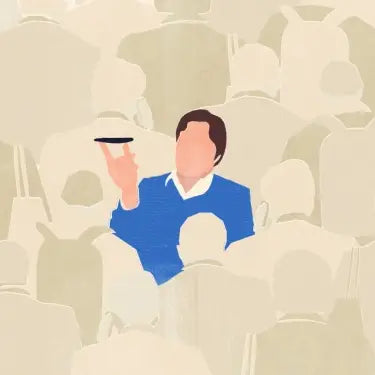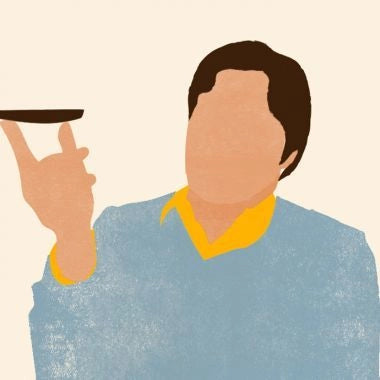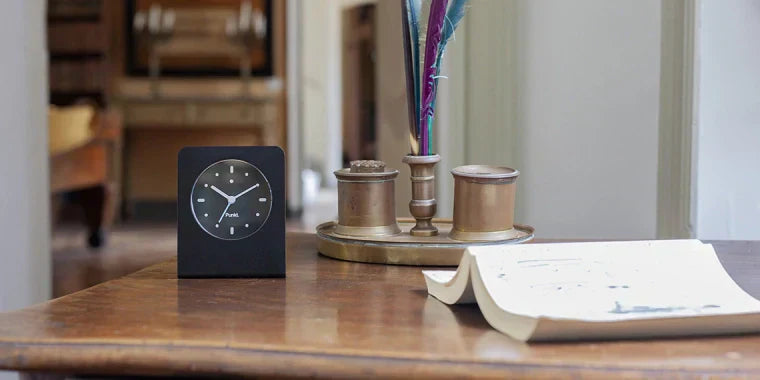Look Around, by Henrietta Thompson

Writer, curator and editor-at-large of Wallpaper* magazine Henrietta Thompson has written a thoughtful essay for Punkt. entitled ‘Look Around’. In her essay Thompson explores how pervasive digital technologies are impacting our social lives. How they affect our notions of privacy, our approach to multitasking, and ultimately how we interact with each other. In ‘Look Around’ Petter Neby shares his views on preserving good habits to help rebalance people’s relationship with technology.
Look around. In any public space today – a train carriage perhaps, or a bar, a concert, a party, even just a busy street – the scene is the same: people staring at little individual screens. Count them. Taking selfies, checking maps, typing out texts an emails, but more often than not just scrolling, checking, swiping.
Consumed and consuming bite sized nuggets of new information and entertainment. Although it’s easy not to notice (partly because it’s become so normal, but also because we’re all equally engrossed in our devices ourselves) if you do stop and think how this revolution has happened in the space of only a few years, it’s nothing short of phenomenal. And a little scary.
We’re not stupid though. We know how the smartphone and its cousins, the laptop and tablet, have changed the way we interact with each other, the way we access and retain information, and the way we travel through life. We know that while there are countless positives, easily marketed to us, of this new super-connectivity, this instant-access everything, and always-on mentality, it’s also important to be wary. We’re aware – at least – that by concentrating on these tiny squares for such long periods of our days (and nights) we might be missing out on something out there in the ‘real world’, though we’re not always quite sure what.
We’re righteous that there should be a new smartphone etiquette, but there’s no real consensus to what that is exactly. We collectively love the idea of piling phones in the middle of a dinner table – the first to pick their up pays the bill – it’s just we don’t want to be the one to suggest it in reality.
We know we are only fueling our now epidemic insomnia by checking social media under the duvet. We are outraged if our date ignores us, to “quickly” check a message, but know we often do the same. If we come across a beautiful view, a wellpresented meal, an inspiring piece of art, our first reaction now is a simple one: shoot it, share it, and count the likes. We are shocked how lost we feel, how emptyhanded, if we find ourselves without our regular prop – even for just a matter of hours. Addicted? Apparently so – smartphone withdrawal symptoms have been compared to that of any other addiction. There are names for new syndromes: 'sleep texting' and 'phantom vibrations'. ‘Nomophobia’ describes our fear of leaving our phones at home.
We know all this, but still we stare. Because despite all of this mobile technology is surely progress. Life is faster, fuller – we are smarter, more popular, with more possibilities than ever before. It’s a trade off: the zombie apocolypse is the path to a brighter future. We are buying the dream.
Whose dream? Because if it’s the dream of the world’s biggest technology giants, it’s a dream accompanied by some scary statistics. A recent study by the University of Derby says 13 per cent of us are addicted, with the average user now spending at least 3.6 hours a day on their smartphone. The study recommends the products should actually come with a health warning. But it’s not just the devices themselves that are so addictive, it’s the apps: each of the programmes – from Twitter to training tools, Candy Crush to camera filters, they are all designed to make us look and keep us hooked.

We know all this, but…
Mobile technology’s most major selling point is that it’s suppose to save us time by enabling us to do more and more things at once. If we can work on the way home, we will free up more time for our families, if we can be more flexible with our diaries we will have richer personal lives. But the reality has proven to be the opposite. Multitasking has been scientifically proven to compromise our results in all areas – the ability to concentrate with no distractions is no less key to productivity than it has ever been, and we’re loosing it. While we might be getting more done in less time, we are actually doing those things worse – whether those things are preparing a report, pitching a proposal, or parenting.
Being 'always on’, furthermore, is exhausting. Though we might be widening our networks online, we’re becoming less social in real life too. We’re simply too tired, too anxious, and more likely to avoid people. It’s a vicious circle – with less energy to engage in conversations it’s easier to seek refuge online. The couple in the romantic restaurant both subsumed in their phones? They’re just tired. But it doesn’t make it any less heartbreaking to watch. It sounds dramatic to say we are losing the art of conversation and physical contact, but look around…
It’s easy to dismiss outrage at smartphone ‘behaviour’ as a generational thing. Those who can remember a time before are often shocked by how much life has changed, and the the olden days always look better from a distance. In their eagerness to not turn into their parents, to keep up with the kids, however, it’s Generation X who have embraced technology with an unquestioning enthusiasm. For Gen Y, meanwhile, it’s a different story. Privacy is already a big issue for those who have grown up with digital devices. Having lived in an era where their every move is shared, they often exist in a state of angst while their whole lives are being archived.
Sherry Turkle is the author of the thoughtful and fascinating book, Alone Together. "The experience of being at one's computer or cell phone feels so private that we easily forget our true circumstance: with every connection we leave an electronic race," she says. For today’s teenagers online is where they find emotional connection, where they get the attention they crave. But without privacy the borders of intimacy blur. Teenagers are encouraging their own survellience, and stalking is a prolific problem.
It’s interesting to look at our attititudes to other new technologies – our fear, for example, around Artificial Intelligence. Meanwhile, the makers of mobile technology have invested hugely successfully in creating an interface that we find so comforting we no longer feel threatened by the changes that are happening. Punkt.’s Petter Neby makes a valid point when he says his concern is not so about Artificial Intelligence so much as humans – real intelligence – becoming more artificial.
“Every time we disrupt the nearness of those around us, whether that is the barman, or the woman that you pass when you walk your dog, if we stop talking to these people, we become more and more introvert and are less able to handle information that comes to us that is not programmed to come to us. We are sitting here with a big panel of instruments that manages our relationship with the outside world. That’s not how we are supposed to be. Our intelligence, our instincts, are the glue of society, and it is being compromised.”
But it’s not all doom and gloom. Digital Downtime is increasingly recognised for its huge advantages on health, wellbeing and work productivity too, and as a result we are finding more and more products and services springing up to help us make the break.
“Studies showing the benefits of taking time away from the multi-screen environment are encouraging people to De-Tech for hours, even days at a time. Look for more employers, schools, media outlets and parents to endorse digital downtime. These mindful breaks from digital input will be intended to relieve stress and foster creativity.” - say future forecasters JWT.
Meanwhile, the hospitality industry has attempted such initiatives as no-phone zones, and there’s been a smattering of initiatives, apps and software elsewhere helping users to regain control by disabling internet access at key times and in particular places. As we all begin to recognise that we sometimes need a break from technology, we’ll find (or invent) more and more tools to help us do this.
If there’s anything we’ve learned in the history of humankind it’s surely this: it is possible to have too much of a good thing. Balance is the key to a good life, and a healthy body and mind. Technology is our tool, not the other way around. When it seems like technology is taking over, demanding our attention, dominating conversations and buzzing in our bags, backpockets or even on our wrists, it helps to remember the boundless potential and power of the human mind and spirit. It helps to look around.
Henrietta Thompson is editor‐at‐large of Wallpaper* magazine and design columnist for The Telegraph Luxury. She writes about architecture, art and design for several publications worldwide. Henrietta is the author of five books and is interested in design that has meaning, rather than being purely decorative.












